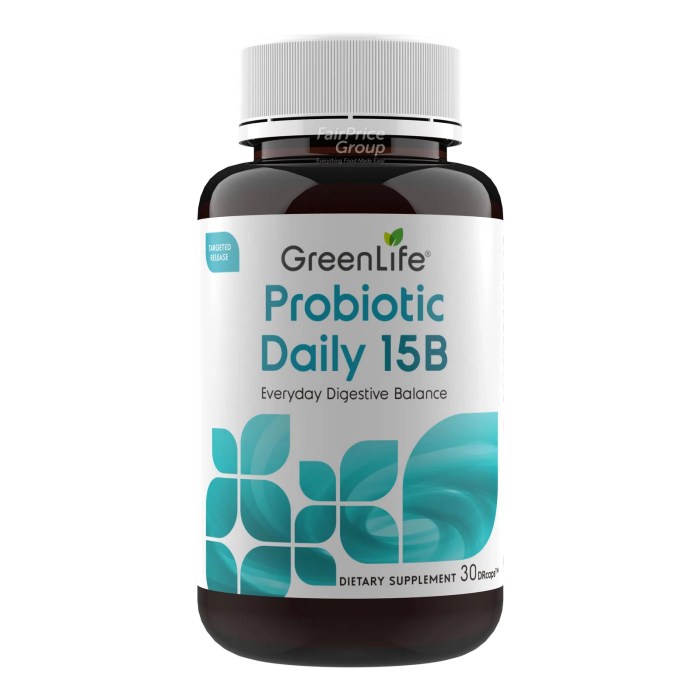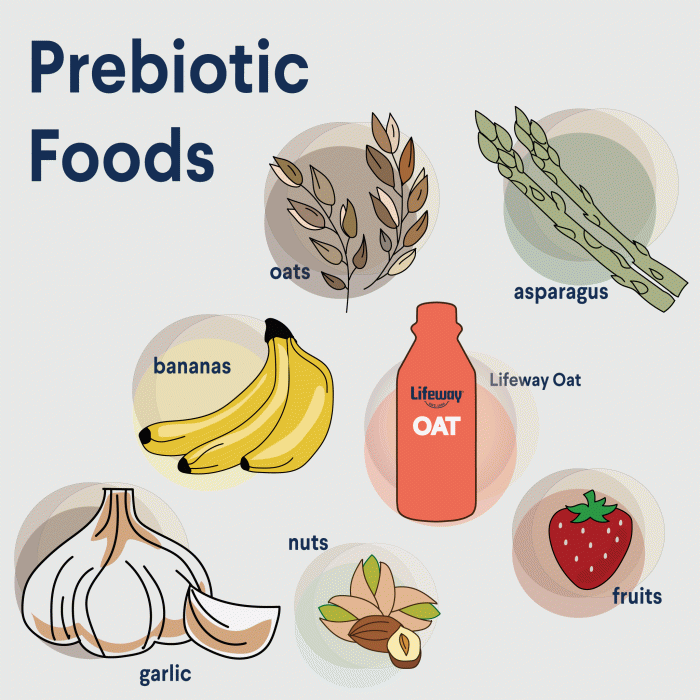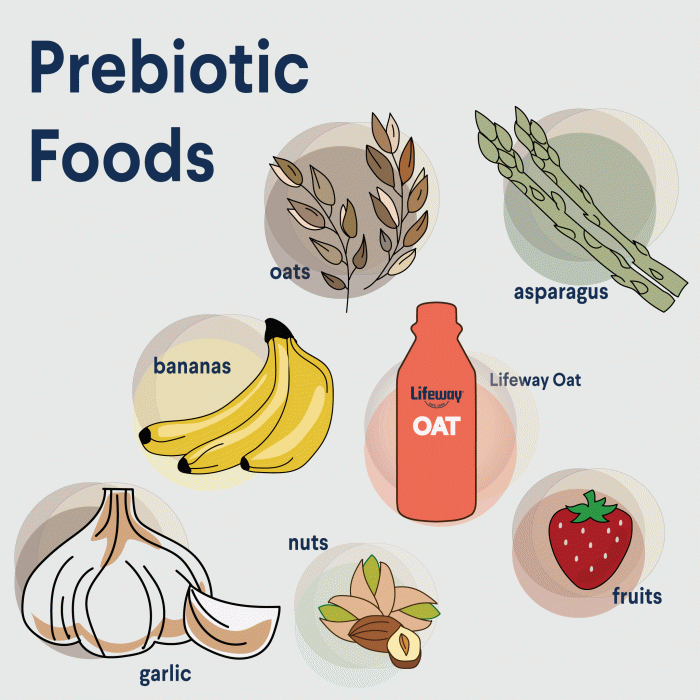Best probiotics for women: Unlocking the power of gut health for optimal well-being. This comprehensive guide explores the diverse world of probiotics, delving into their benefits, types, and how to choose the right ones for you. From vaginal health to mood regulation, we’ll uncover how probiotics can positively impact various aspects of a woman’s life. Discover the science behind these beneficial bacteria and learn how to incorporate them into your daily routine for a healthier, happier you.
We’ll cover everything from the basics of probiotics and their role in women’s health to specific benefits like improved vaginal health and hormonal balance. We’ll also explore different probiotic types, popular brands, and how to choose the right supplement for your needs. Plus, we’ll delve into the crucial aspects of dosage, potential side effects, and the importance of consulting a healthcare professional.
Introduction to Probiotics for Women
Probiotics are live microorganisms that, when consumed in adequate amounts, confer a health benefit on the host. For women, these beneficial bacteria play a crucial role in maintaining overall well-being, particularly in supporting digestive health, immune function, and even potentially influencing mood. Understanding the different strains and their effects can help women make informed choices about incorporating probiotics into their routines.Probiotics offer a wide array of potential benefits for women.
Beyond the well-established support of digestion, they may contribute to a healthier gut microbiome, which in turn can potentially enhance the body’s natural defenses against illnesses and even influence mood and energy levels. The specific benefits and effectiveness can vary depending on the individual and the specific probiotic strains consumed.
Probiotic Strains and Their Potential Effects
Different probiotic strains have varying effects on the body. Lactobacillus and Bifidobacterium are common strains found in many probiotic supplements and foods. Lactobacillus strains, for example, are frequently associated with supporting healthy digestion and promoting the growth of beneficial bacteria in the gut. Bifidobacterium strains are also often linked to digestive health and immune function. Understanding the specific strains and their potential effects can aid in choosing probiotics that align with individual needs.
Probiotics and Digestive Health in Women
Probiotics can significantly impact women’s digestive health. The gut microbiome, a complex ecosystem of bacteria, plays a vital role in digestion, nutrient absorption, and immune function. A healthy gut microbiome is crucial for efficient digestion, preventing issues like bloating, gas, and constipation. Probiotics work by introducing beneficial bacteria into the gut, helping to restore balance and support optimal digestion.
Comparison of Probiotic Types for Women
| Probiotic Type | Common Strains | Potential Benefits | Considerations |
|---|---|---|---|
| Lactobacillus | L. acidophilus, L. rhamnosus, L. casei | Improved digestion, immune support, potential relief from digestive discomfort | May not be suitable for all individuals, and some strains may have different effects |
| Bifidobacterium | B. bifidum, B. longum, B. lactis | Improved digestion, immune support, potential role in gut health maintenance | Different strains can have varying impacts; consult with a healthcare professional for specific needs |
| Saccharomyces boulardii | Saccharomyces boulardii | May help maintain gut health and support the immune system, potentially useful for travelers’ diarrhea | May interact with certain medications; consult with a doctor for interactions |
This table provides a general overview of common probiotic types and their potential benefits. It’s essential to note that individual responses to probiotics can vary. Consult with a healthcare professional before starting any new probiotic regimen, especially if you have underlying health conditions or are taking medications.
Finding the best probiotics for women can be tricky, but focusing on gut health is key for overall wellness. Speaking of wellness, if you’re looking to sculpt your physique without the bench press, check out these 4 chest cheat codes for a fuller chest no bench press needed. 4 chest cheat codes for a fuller chest no bench press needed A healthy gut means a healthier you, so remember to prioritize those good bacteria with the right probiotic choice for your needs!
Specific Benefits for Women
Probiotics, those beneficial bacteria, aren’t just for gut health. They play a surprisingly significant role in various aspects of women’s well-being. From vaginal health to mood regulation, the potential benefits of incorporating probiotics into a woman’s lifestyle are becoming increasingly clear. Understanding these benefits can empower women to make informed choices about their health and well-being.Probiotics can positively influence several aspects of women’s health.
Finding the best probiotics for women can be tricky, but a healthy gut is key! Planning a relaxing vacation can be just as important, especially if you’re looking for some rejuvenation. For example, exploring some of the most stunning destinations on Earth, like the ones featured in 12 jaw dropping vacation spots that will leave you awestruck , can be a fantastic way to recharge.
Ultimately, a healthy lifestyle, including the right probiotics, is the best way to feel amazing both at home and when traveling!
This includes supporting vaginal health, potentially impacting hormonal balance, and alleviating symptoms related to premenstrual syndrome (PMS). Furthermore, they might contribute to better skin health and even mood regulation. The specific mechanisms through which probiotics achieve these benefits are still being investigated, but evidence suggests a strong link between beneficial bacteria and improved overall well-being.
Vaginal Health
Probiotics can contribute to a healthy vaginal microbiome, which is crucial for maintaining a balanced environment. A healthy vaginal microbiome helps to prevent infections and maintain the natural pH balance. This balance is essential for preventing yeast infections and bacterial vaginosis, common issues that women may face. Maintaining a healthy vaginal environment can also lead to reduced discomfort and improved overall vaginal health.
Hormonal Balance
The intricate relationship between the gut microbiome and hormones is an active area of research. The gut microbiome is believed to influence hormone production and metabolism. This interplay could potentially impact women’s hormonal cycles and contribute to overall hormonal balance. More research is needed to fully understand the extent of this influence.
PMS Relief
Probiotics may play a role in alleviating symptoms associated with premenstrual syndrome (PMS). Some studies suggest that probiotics can help regulate the gut microbiome, potentially leading to improved mood and reduced bloating, which are common PMS symptoms. Individual experiences with probiotics and PMS relief may vary.
Skin Health
The skin microbiome, a community of microorganisms on the skin’s surface, is believed to be influenced by the gut microbiome. Some research suggests that probiotics may indirectly improve skin health by promoting a healthier gut environment, which in turn can positively impact the skin’s overall condition. This indirect effect could potentially reduce acne and other skin issues.
Mood Regulation
The gut-brain axis, the complex communication pathway between the gut and the brain, is an important consideration when discussing probiotics and mood. The gut microbiome is increasingly recognized for its role in mood regulation. Probiotics may influence neurotransmitter production and potentially impact mood. This connection between the gut microbiome and mood regulation is an area of ongoing investigation.
Probiotic Strains and Potential Impacts
| Probiotic Strain | Potential Impact on Women’s Health |
|---|---|
| Lactobacillus rhamnosus GG | Vaginal health, immune function, potential PMS symptom relief |
| Lactobacillus acidophilus | Vaginal health, digestive health, potential mood regulation |
| Bifidobacterium bifidum | Digestive health, immune function, potential impact on hormonal balance |
| Lactobacillus plantarum | Digestive health, immune function, potential skin health benefits |
Note: This table provides a general overview and is not exhaustive. Individual responses to probiotics can vary significantly. Consult with a healthcare professional before incorporating any new supplements into your diet.
Types and Brands of Probiotics
Choosing the right probiotic supplement can be overwhelming. Different strains of beneficial bacteria have different effects on the body, and not all probiotics are created equal. Understanding the various types and brands available, along with the factors to consider, is crucial for selecting a supplement that meets your specific needs. This guide will help you navigate the world of probiotics and make informed decisions.Probiotics are live microorganisms that, when consumed in adequate amounts, offer health benefits.
They’re often touted as a way to improve gut health, boost immunity, and even manage certain conditions. However, the market is filled with a plethora of options, making it essential to understand the different types, formulations, and brands.
Different Types of Probiotic Supplements
Various types of probiotic supplements are available, each containing different strains of beneficial bacteria. These strains are classified based on their scientific names and specific functionalities. Some common types include Lactobacillus and Bifidobacterium, which are widely studied for their health benefits. Other types may include strains like Streptococcus or Saccharomyces boulardii. Knowing the specific strains and their purported effects can help you choose a supplement that aligns with your goals.
Factors to Consider When Choosing a Probiotic
Several factors play a crucial role in selecting the right probiotic supplement. The specific strain of bacteria, the colony-forming units (CFUs), the formulation, and the overall quality of the product are all important considerations. Look for supplements that contain a sufficient number of CFUs, ensuring that enough live bacteria reach your gut to exert their beneficial effects. Also, consider the source of the bacteria, the manufacturing process, and the potential for contamination.
Reading reviews and seeking guidance from healthcare professionals can be helpful in making informed choices.
Popular Brands of Probiotics Marketed Towards Women
Numerous brands offer probiotic supplements specifically tailored to women’s needs. These supplements often incorporate strains known for their benefits in supporting women’s health. They might include strains that promote digestive health, regulate hormone balance, or bolster the immune system. Some brands might offer unique formulations with ingredients specifically chosen to address potential health concerns in women.
Comparing Different Probiotic Formulations
Probiotic supplements come in various forms, each with its own advantages and disadvantages. Capsules are a common and convenient option, while powders and gummies might be preferred for palatability or specific delivery methods. Liquid formulations may offer higher bioavailability, allowing for quicker absorption of the probiotics. The chosen formulation should depend on personal preferences and individual needs.
Consider factors such as taste, ease of consumption, and potential interactions with other medications or supplements when making your decision.
Popular Probiotic Brands, Ingredients, and Price Ranges
| Brand | Key Ingredients (Example Strains) | Approximate Price Range |
|---|---|---|
| Culturelle | Lactobacillus rhamnosus GG | $20-$40 (depending on size) |
| Renew Life | Lactobacillus acidophilus, Bifidobacterium lactis | $25-$50 (depending on size) |
| Garden of Life | Lactobacillus plantarum, Bifidobacterium bifidum | $30-$60 (depending on size and formulation) |
| Jarrow Formulas | Various strains including Lactobacillus and Bifidobacterium | $25-$50 (depending on size) |
Note: Price ranges are approximate and can vary depending on the specific product and retailer. Always check the product details for precise pricing.
Choosing the Right Probiotic

Finding the right probiotic supplement can feel like navigating a complex jungle of strains, dosages, and claims. This crucial step involves understanding your unique needs and how different probiotics can impact your health. Proper selection goes beyond simply choosing a product; it’s about selecting a probiotic tailored to your specific circumstances and goals.
A Personalized Approach to Probiotic Selection
Choosing the most suitable probiotic requires a thoughtful, personalized approach. A flowchart can guide you through this process, ensuring you select a supplement that aligns with your individual needs.
This flowchart illustrates a step-by-step process for selecting a probiotic. It begins by understanding your health goals and current health status. Next, consider any specific health concerns or dietary restrictions. Research different probiotic strains and their purported benefits. Finally, carefully evaluate product labels for quality and efficacy, and consider consulting a healthcare professional for personalized guidance.
This personalized approach is crucial for achieving optimal results.
The Importance of Professional Guidance
Consulting a healthcare professional before starting any new supplement regimen, including probiotics, is highly recommended. A doctor or registered dietitian can assess your overall health, identify potential interactions with existing medications, and provide tailored advice based on your specific needs. This personalized approach ensures that the probiotic you choose aligns with your health profile and avoids any potential complications.
Finding the best probiotics for women can be tricky, but it’s definitely worth the effort. Often, we get so caught up in the daily grind and the need to control everything, we stifle our natural curiosity and stop exploring. This can actually negatively impact our gut health, just as how kill our innate curiosity and how stop doing that can affect our overall well-being.
Ultimately, prioritizing gut health through the right probiotics can lead to a more balanced and energized life.
Evaluating Probiotic Supplement Labels
Understanding how to evaluate probiotic supplement labels is crucial for making informed decisions. Look for reputable brands with third-party verification of their quality and efficacy. Crucially, pay close attention to the following:
- Strain Identification: The label should clearly list the specific probiotic strains included in the supplement, along with their scientific names (genus and species). This is essential for determining the potential benefits of the chosen strains.
- CFU Count: The number of colony-forming units (CFUs) per dose is a critical indicator of the probiotic’s potency. A higher CFU count generally suggests a more potent supplement.
- Guaranteed Viability: Look for supplements that guarantee the viability of the probiotics at the time of consumption. This ensures that the probiotics will survive the digestive process and reach the gut in sufficient numbers to exert their effects.
- Third-Party Testing: Look for certifications from reputable third-party organizations that validate the product’s quality and purity. This is a critical indicator of the supplement’s reliability.
Selecting Probiotic Strains for Specific Health Concerns
Different probiotic strains have varying effects on the body. Selecting a strain appropriate for a specific health concern is essential for maximizing benefits.
- Gastrointestinal Issues: Strains like Lactobacillus acidophilus and Bifidobacterium bifidum are often recommended for promoting healthy digestion and alleviating symptoms of irritable bowel syndrome (IBS) and other gastrointestinal conditions.
- Immune Support: Certain strains, such as Lactobacillus rhamnosus and Bifidobacterium lactis, are known for their potential to support immune function.
- Mental Well-being: Some studies suggest a link between gut health and mental well-being. Strains like Lactobacillus plantarum and Bifidobacterium longum may play a role in this area, though more research is needed.
Factors to Consider When Selecting a Probiotic
| Factor | Explanation |
|---|---|
| Strain Specificity | Identifying specific strains beneficial for targeted health concerns. |
| CFU Count | Evaluating the number of live bacteria to ensure potency. |
| Manufacturing Practices | Ensuring the supplement is produced under rigorous standards. |
| Third-Party Verification | Checking for certifications to validate quality and purity. |
| Individual Health Needs | Considering existing health conditions and medications. |
| Cost | Comparing prices and selecting a budget-friendly option. |
Dosage and Usage: Best Probiotics For Women
Taking probiotics effectively is key to reaping their benefits. Proper dosage and usage significantly impact how your body absorbs and utilizes these beneficial bacteria. Understanding the recommended amounts, optimal intake methods, and potential side effects empowers you to integrate probiotics safely and effectively into your daily routine.
Recommended Dosage for Women
The recommended dosage of probiotics for women varies depending on the specific strain, the product, and individual needs. A general guideline is to follow the manufacturer’s instructions carefully. These instructions will typically specify the recommended daily dose of the probiotic. It’s crucial to consult with a healthcare professional, particularly if you have underlying health conditions or are taking other medications, to determine the best dosage for your specific situation.
Optimal Absorption of Probiotics
For optimal probiotic absorption, consider taking them at a time when your stomach’s acidity is not at its peak. Many experts suggest taking probiotics with food, as this can help protect the bacteria from being destroyed by stomach acid. Consuming probiotics with a meal that contains a moderate amount of fat can further enhance absorption. Avoid taking probiotics with very acidic foods, such as citrus fruits, or very large meals.
Potential Side Effects and Management
Some women may experience mild side effects such as bloating, gas, or diarrhea when starting a probiotic regimen. These side effects are typically temporary and resolve as your body adjusts. If the side effects are severe or persistent, discontinue use and consult a healthcare professional. It’s also essential to maintain good hydration, as this can help to manage any digestive discomfort.
Incorporating Probiotics into a Daily Routine
Integrating probiotics into your daily routine can be seamless. Consider incorporating probiotic-rich foods into your meals, such as yogurt, kefir, or kimchi. If you prefer a supplement, choose a reputable brand and follow the dosage instructions. Consistency is key; taking probiotics regularly will help ensure the bacteria colonize in your gut.
Dosage Recommendations for Various Probiotic Strains
| Probiotic Strain | Typical Daily Dosage (CFU) | Important Considerations |
|---|---|---|
| Lactobacillus acidophilus | 1-10 billion CFU | Look for strains specifically designed for women’s health |
| Bifidobacterium bifidum | 1-10 billion CFU | May be beneficial for digestive health and immune support |
| Lactobacillus rhamnosus | 1-10 billion CFU | Often found in products targeting gut health |
| Lactobacillus plantarum | 1-10 billion CFU | May support immune function and digestive regularity |
Note: CFU stands for Colony Forming Units, a measure of the number of viable bacteria in a probiotic product. The specific dosage and CFU count will vary greatly depending on the product. Always refer to the manufacturer’s instructions. These values are general guidelines and individual responses may vary. Consult a healthcare professional before starting any new supplement regimen.
Research and Evidence
Probiotics, while often touted as a health panacea, require a robust foundation of scientific research to support their claims. Understanding the methodologies employed in studies and the sources of this research is crucial for evaluating the evidence surrounding their effectiveness, especially for women’s health. This section delves into the scientific backing behind probiotic use, examining both the strengths and limitations of current research.
Scientific Studies on Probiotics and Women’s Health
Studies investigating probiotics and women’s health often focus on specific conditions and populations. These studies typically employ controlled trials and observational studies to assess the impact of probiotic intake on various aspects of women’s well-being. The scientific community is actively exploring the intricate relationship between gut microbiota and various health conditions in women, including digestive issues, immune function, and even mental health.
Study Methodologies
The methodologies employed in probiotic research vary depending on the specific research question. Randomized controlled trials (RCTs) are considered the gold standard. In these trials, participants are randomly assigned to either a probiotic group or a placebo group, and researchers monitor outcomes to assess the probiotic’s effect. Observational studies, on the other hand, analyze existing data to identify correlations between probiotic use and health outcomes.
Meta-analyses, which combine the results of multiple studies, offer a comprehensive view of the collective evidence.
Reputable Sources for Probiotic Information, Best probiotics for women
Reliable sources for information on probiotics include peer-reviewed scientific journals, reputable medical organizations, and government health agencies. These sources prioritize evidence-based findings and adhere to strict editorial standards. Websites affiliated with universities or medical institutions are also valuable resources. Be cautious of sources that lack scientific backing or promote unsubstantiated claims. Scrutinizing the credentials of the authors and the methodologies used in the studies is critical.
Long-Term Effects of Probiotic Use
Long-term effects of probiotic use for women remain an area of ongoing research. While short-term benefits are often observed, the sustained impact of consistent probiotic intake requires more extensive and longitudinal studies. These studies will need to consider the dynamic nature of the gut microbiome and the potential for long-term interactions with the body’s overall health. Factors like individual genetic predisposition, diet, and lifestyle play a role in the long-term outcomes.
Summary of Key Research Findings
| Probiotic Strain | Specific Condition | Key Findings | Limitations |
|---|---|---|---|
| Lactobacillus rhamnosus GG | Vaginal health, digestive issues | Studies show potential benefits in managing vaginal infections and improving digestive symptoms. | Further research needed to confirm long-term efficacy and consistency across diverse populations. |
| Bifidobacterium lactis | Immune function, gut health | Some studies suggest a positive impact on immune response and gut barrier function. | Large-scale, long-term studies are required to establish conclusive links. |
| Lactobacillus acidophilus | Digestive issues, vaginal health | Demonstrates promise in improving digestive health and potentially supporting vaginal health. | Consistency of findings across various studies needs to be confirmed. |
| Lactobacillus plantarum | Gut health, immune modulation | Potential to influence gut microbiota composition and immune responses. | Limited long-term studies hinder complete understanding of sustained effects. |
Note: This table summarizes key findings but does not represent all available research. Individual results may vary.
Important Considerations
Probiotics, while generally safe, aren’t a one-size-fits-all solution. Their effectiveness can be influenced by several factors, and understanding these nuances is key to maximizing their potential benefits. This section delves into crucial considerations for women using probiotics, including potential interactions with medications, the importance of diet, and the impact of lifestyle choices on gut health.A balanced approach, combining probiotics with a healthy diet and lifestyle, is essential for optimal results.
Neglecting these factors can lessen the impact of probiotics, potentially hindering the desired effects.
Potential Interactions with Medications
Certain medications can interact with probiotics, either reducing their effectiveness or causing adverse effects. It’s crucial to consult a healthcare professional before introducing probiotics, especially if you’re taking other medications. These interactions can range from minor to significant, impacting the absorption or metabolism of both the probiotic and the medication.
- Many medications can alter the gut microbiome, impacting the effectiveness of probiotics. Antibiotics, for example, can kill beneficial bacteria, potentially diminishing the probiotic’s impact.
- Some medications can interfere with the absorption of probiotics in the digestive tract. This can reduce the number of live, active cultures reaching their target location in the gut.
- Probiotics might influence the metabolism of certain medications, potentially affecting their efficacy or side effects. For example, some medications require specific absorption pathways that might be altered by the presence of probiotics.
Importance of a Balanced Diet
A healthy gut microbiome thrives on a balanced diet rich in diverse nutrients. Probiotics are beneficial, but they work best when paired with foods that support their function.
- A diet rich in fruits, vegetables, and whole grains provides the necessary nutrients for a thriving gut microbiome. Fiber, in particular, is crucial for supporting the growth of beneficial bacteria.
- Limiting processed foods, sugary drinks, and excessive amounts of saturated fats can negatively impact gut health. These foods can disrupt the balance of the gut microbiome and potentially hinder the effectiveness of probiotics.
- Probiotics alone won’t significantly improve gut health if the diet is poor. A healthy diet should be considered a cornerstone of gut health, supporting the beneficial impact of probiotics.
Impact of Lifestyle Factors on Probiotic Effectiveness
Lifestyle factors such as stress, sleep patterns, and exercise can significantly affect the gut microbiome’s health.
- Chronic stress can disrupt the balance of gut bacteria, potentially reducing the effectiveness of probiotics. Finding healthy stress-management techniques is crucial for overall gut health.
- Adequate sleep is essential for maintaining a healthy gut microbiome. Sleep deprivation can lead to an imbalance of gut bacteria, potentially impacting the effectiveness of probiotics.
- Regular exercise promotes overall health, including gut health. Physical activity can positively influence the composition and function of the gut microbiome, potentially enhancing the benefits of probiotics.
Maintaining a Healthy Gut Microbiome
Maintaining a healthy gut microbiome requires a proactive and consistent approach.
- Consume a diverse range of fruits, vegetables, and whole grains to provide the necessary nutrients for a thriving gut microbiome.
- Manage stress effectively through relaxation techniques, mindfulness practices, or other suitable methods. Chronic stress can disrupt gut health.
- Prioritize adequate sleep to maintain a healthy gut balance. Aim for 7-9 hours of quality sleep per night.
Potential Interactions Table
| Medication Category | Potential Interaction | Recommendation |
|---|---|---|
| Antibiotics | May reduce the effectiveness of probiotics by killing beneficial bacteria. | Take probiotics at least 2 hours apart from antibiotics. Consult a doctor. |
| Antacids | May reduce the absorption of probiotics. | Take probiotics at least 2 hours apart from antacids. Consult a doctor. |
| Proton Pump Inhibitors (PPIs) | May reduce the absorption of probiotics. | Take probiotics at least 2 hours apart from PPIs. Consult a doctor. |
| Certain Medications for Inflammatory Bowel Disease | May interact with the probiotics, potentially altering the effectiveness of the treatment. | Consult a doctor before taking probiotics. |
Probiotic-Rich Foods

Nourishing your gut with beneficial bacteria doesn’t always require a supplement. Many delicious and readily available foods are naturally packed with probiotics, offering a fantastic way to support your digestive health and overall well-being. These foods, often fermented, undergo a process that encourages the growth of beneficial bacteria, providing a concentrated source of probiotics.Beyond simply adding probiotics to your diet, consuming probiotic-rich foods contributes to a healthier gut microbiome, which has a ripple effect on various aspects of your health.
This, in turn, supports immunity, aids digestion, and may even positively influence mood and energy levels. These foods are an integral part of a balanced and healthy diet.
Naturally Fermented Foods: A Probiotic Powerhouse
Fermented foods are a cornerstone of probiotic intake. The fermentation process creates an environment conducive to the growth of beneficial bacteria, making these foods a concentrated source of probiotics. These foods often provide a variety of nutrients beyond the probiotics themselves, contributing to a well-rounded diet.
Probiotic-Rich Foods and Their Benefits
- Yogurt: A classic probiotic source, yogurt is widely available and enjoyed by many. The live and active cultures in yogurt contribute to a healthy gut microbiome. Look for yogurts labeled “plain” and with active cultures, as these contain the highest concentration of probiotics. It’s a versatile food, adding protein and calcium to your diet.
- Kefir: A fermented milk drink, kefir boasts a higher concentration of probiotics than yogurt. Its slightly tangy flavor adds a delightful twist to your daily routine. Kefir offers diverse probiotic strains and is often enjoyed as a refreshing beverage.
- Kimchi: This spicy Korean fermented cabbage dish is a vibrant source of probiotics. Its unique flavor profile adds a zestful touch to meals. Kimchi’s preparation often involves various vegetables, offering additional vitamins and minerals.
- Sauerkraut: This fermented cabbage is a well-known probiotic food, with a unique and tangy flavor. It’s a versatile ingredient, adding a flavorful kick to salads, sandwiches, or enjoyed on its own. Sauerkraut is packed with beneficial probiotics and is a great source of vitamins and minerals.
- Tempeh: A fermented soybean product, tempeh provides a satisfying texture and protein boost. It’s often used as a meat substitute, offering a vegetarian protein source rich in probiotics.
- Kombucha: A fermented tea drink, kombucha is gaining popularity for its probiotic content. It provides a unique flavor profile and a refreshing alternative to other beverages. The specific probiotic content can vary greatly based on the recipe and brand.
Comparing Probiotic Content in Fermented Foods
The probiotic content varies significantly between different fermented foods. Factors like the specific bacteria used in fermentation and the processing methods play a crucial role in the final concentration of probiotics. For instance, some yogurts are specifically formulated to enhance probiotic content, whereas kimchi and sauerkraut may have naturally varying levels depending on the fermentation process. It’s crucial to understand that the exact probiotic content in a food item can vary widely.
Probiotic-Rich Foods: A Nutritional Overview
| Food | Approximate Probiotic Content | Nutritional Value |
|---|---|---|
| Yogurt (plain, active cultures) | High | Protein, Calcium, Vitamin D (depending on fortification) |
| Kefir | Very High | Protein, Calcium, Vitamins |
| Kimchi | Medium | Vitamins, Minerals, Fiber, Antioxidants |
| Sauerkraut | Medium | Vitamins, Minerals, Fiber, Antioxidants |
| Tempeh | Medium | Protein, Fiber, Vitamins, Minerals |
| Kombucha | Variable | Probiotics, Vitamins, Minerals (depending on the recipe) |
Note: Probiotic content can vary depending on the specific product and preparation methods. Nutritional values are approximate.
Recipes Featuring Probiotic-Rich Foods
To demonstrate the versatility of these foods, here are a couple of recipe ideas incorporating yogurt and sauerkraut.
- Yogurt Parfait: Layer plain yogurt with granola, berries, and a drizzle of honey for a quick and easy breakfast or snack. This is a simple and delicious way to incorporate probiotics into your diet.
- Sauerkraut Salad: Combine shredded cabbage, carrots, and onions with a vinaigrette dressing. Add chopped sauerkraut for a tangy and probiotic-rich salad.
End of Discussion
In conclusion, best probiotics for women can be a powerful tool for overall well-being. This guide has provided a comprehensive overview of probiotics, exploring their benefits, types, and selection process. Remember to consult your doctor before starting any new supplement regimen, and prioritize a balanced diet and lifestyle alongside your probiotic choices. Choosing the right probiotic and incorporating it into your routine can contribute to improved gut health, which can positively impact various aspects of your life.











